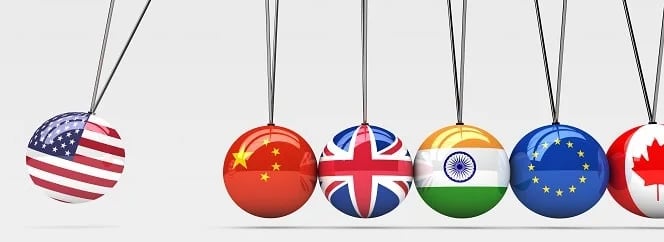Going International as an American Small Business
Posted on June 01, 2020 by Boston Centerless
As you may know, small businesses with less than 500 employees in the United States employ approximately 48% of all working age Americans.
Given that fact, the vitality of America’s small businesses is critical when it comes to keeping the American economy robust. You may also think that small businesses must strategically concentrate on marketing and selling their products primarily to domestic markets. But can the American economy be robust if nearly half of the economic engine only sells within the U.S. borders? After all, only large corporations can afford the resources to market and sell products internationally since it takes personnel, extensive travel time and expense, language translation services and an understanding of different business customs and cultures, right? How can an American small business afford all that? It is true that large multi-national corporations invest largely in their international operations. However, as a small business in the United States, it is indeed possible to economically and efficiently develop international markets if you take advantage of the many resources that are available to small businesses. But you have to know where to look for them.
Before we get to the government resources that can be tremendously helpful to small businesses interested in the export markets, let’s review some of the up-front work that needs to be done to determine if international markets are worth pursuing for your product and your company. First things first; you need to determine if there is demand for your product in the geographic market in which you are interested in marketing and selling. If you are as fortunate as I was to have a marketing executive in your organization with market research experience, then that person will know that trade associations exist in most developed markets and can be a treasure trove of information related to market size, revenue generated within the market and even lists of member companies. When our company was seeking to determine the potential for our products in the medical device market in Ireland, we found everything we needed to learn from the Irish Medtech Association (www.irishmedtechassoc.ie). Even if you don’t have a market research professional on staff, you can usually find these trade associations just by doing a Google search.

Once you have established that there is a market for your product in your chosen international region, you must determine what kind of representation you will need. For most small businesses, I will assume that you are not interested in hiring a direct employee located in your international market of choice. Having an out-of-state employee in the U.S. is complicated enough let alone having to understand and comply with often highly restrictive and expensive international labor laws in order to hire a foreign employee. It, therefore, becomes necessary to decide if it is sufficient to work with a sales agency to represent your company or if you need both sales representation and local finished goods inventory to successfully support your market. The need for inventory often requires the services of a warehousing distributor, many of whom have sales and marketing agency services as part of the package they offer their supplier partners. OK, so now you have decided what kind of international partner you are looking for to help you sell your product, but it is a big world out there! How do you identify and qualify potential international partners?
This is where the export services that are available through your state and federal governments really come into play. As a Massachusetts company, we engaged with the Mass Export Center (www.msbdc.org), a commonwealth supported organization that is partially funded by the SBA, the U.S. Small Business Association. They provide an array of free services including export counseling and technical assistance, export regulatory compliance training and international business development assistance. In our case, Mass Export Center offered a free service in which they identified and researched several different sales agencies and distribution firms in our selected geography. The written report comprised of a detailed business description of the candidate firm, key executive personnel with titles and contact information, credit assessments and a concise analysis of the suitability of each candidate to successfully market and sell our product in their respective international market. These free market research reports from Mass Export Center were done in collaboration with the U.S. Department of Commerce Export Services. Commerce Department professionals who are physically located in the international markets of interest contributed to the content of the report. It was this particular service which we found most useful in our efforts to identify and select the ideal international sales, marketing and distribution partners.
Finally, we have found it essential to have a fairly senior level manager who takes responsibility for establishing and nurturing the personal relationships that are so essential to the successful formation of common goals and mutual trust between your business and your international partner. As with any successful long-term relationship, you must commit the time to support your partner on-site in their home market and devote personal attention to the relationship to achieve mutually satisfactory results.
